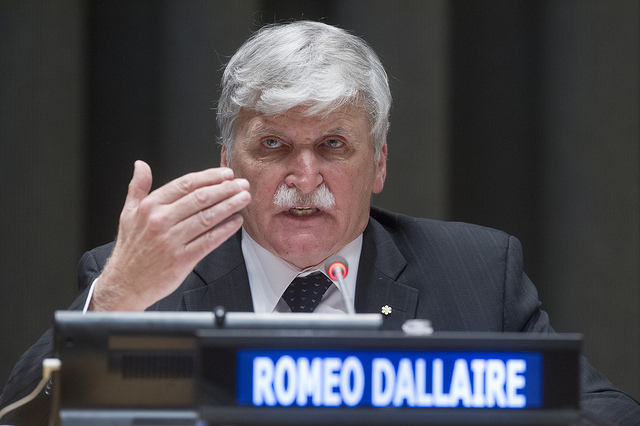Like this article? rabble is reader-supported journalism. Chip in to keep stories like these coming.
In all the years I’ve been consumed with the Rwandan Genocide, I’ve rarely met a Canadian who doesn’t feels some guilt about his or her failure to do something — anything — about it. Yet why should Canadians have done anything? In conventional terms, Canada had few interests in the country, and most Canadians knew next to nothing about it. So, along with the rest of the world, the government of the time decided this distant, little-known place simply wasn’t the business of Canada. This failure ended up shaming many Canadians.
But the personal relationship so many Canadians feel with Rwanda can be explained in two words: Roméo Dallaire — a Canadian lieutenant-general and the force commander of the United Nations mission to Rwanda. Unlike almost every other outsider with a significant role in Rwanda in 1994 — the French, the Catholic Church, the Belgians, U.S. President Bill Clinton — Lt.-Gen. Dallaire did all in his limited power to stop the killings. That he largely failed, admitted his failure and suffered very publicly from post-traumatic stress disorder made him a Canadian hero. Despite his best efforts, perhaps a million people of the Tutsi minority were slaughtered in 100 days without the world raising a finger.
Those who know the African Great Lakes are now fearful that a new disaster looms in this tragic part of the world, this time in Burundi. Burundi and Rwanda are a fascinating, unique phenomenon: next-door neighbours that are almost mirror images of each other. Both are former Belgian colonies that won their independence more than half a century ago. Both are tiny — barely visible on a map of Africa. Both have populations of about 10 million. And both have two major ethnic groups — the majority Hutu, who comprise about 85 per cent of the population, and the minority Tutsi — that are often in conflict despite their overall similarities.
But while the Hutu majority held power in Rwanda from independence until after the genocide, the minority Tutsi ruled Burundi for many decades. Burundi was actually considered the more volatile of the two countries. In fact, some scholars of the region, such as René Lemarchand, believe the first African genocide (other than the slaughter of the Herero of Namibia by the Germans early in the twentieth century) really took place in Burundi in 1972 — though, by a quirk of history, little is known about it.
Twenty years later, the Tutsi minority in Burundi allowed a democratic election in which a Hutu became president. But he was soon assassinated by Tutsi soldiers, leading to years of terrible conflict in Burundi while helping to precipitate the genocide in Rwanda. Burundi escaped a full-blown genocide but the country descended into civil war. Eventually, after 12 years and hundreds of thousands of deaths on both sides, a peace process seemed to bring some calm to the country. Elections were held and agreements reached for the armed forces to be integrated — half-Tutsi and half-Hutu — and for national and local governments to represent both groups. These arrangements were expected to bring real stability, and some observers insist they do.
Yet there are warnings that something terrible may erupt once again in Burundi — maybe even another Rwanda. The UN and the African Union are keeping a close eye. All kinds of mediators are standing by. From conflicting interpretations, it’s hard to know how dangerous the situation really is. The provocative decision of President Pierre Nkurunziza to change the Constitution so he can serve a third term has greatly exacerbated tensions, leading to violent protests and an aborted coup. Some 280,000 Burundians have fled their homes — an astonishing number. The ruling party’s youth wing, the Imbonerakure, is frighteningly similar to the notorious Hutu Interahamwe of the Rwandan Genocide. Still, the killing to date has been relatively limited — 277 people — and not necessarily based on ethnicity. Many Hutu oppose the President, a Hutu.
To complicate matters, Burundi shares Africa’s resource curse: nickel reserves that the United States, Russia and China all covet. No one knows how this will play out, but it’s a troubling aspect of the equation.
Sensible people will watch closely. Hopefully, this will include the Canadian government. It’s too early, it seems to me, to be crying wolf — or genocide. But there is a real potential for serious escalation here, perhaps even to the ultimate level. So ignoring what’s going on in Burundi is even worse than exaggerating it. Dismissing it as just another case of Africans killing each other as Africans are wont to do, as the French establishment liked to say about Rwanda, is flat-out racism. Keeping vigil and being prepared to take all appropriate action — that’s what Canada and the world should be doing.
Rwanda’s genocide was preventable; that reality compounded the 1994 tragedy. For Burundi’s sake, for humanity’s sake, let’s pray that a lesson has been learned and that the so-called international community, including Canada, is not again guilty of being bystanders or even enablers of another Rwanda.
Like this article? rabble is reader-supported journalism. Chip in to keep stories like these coming.
This article originally appeared in The Globe and Mail.
Image: Flickr/Kwibuka Rwanda



